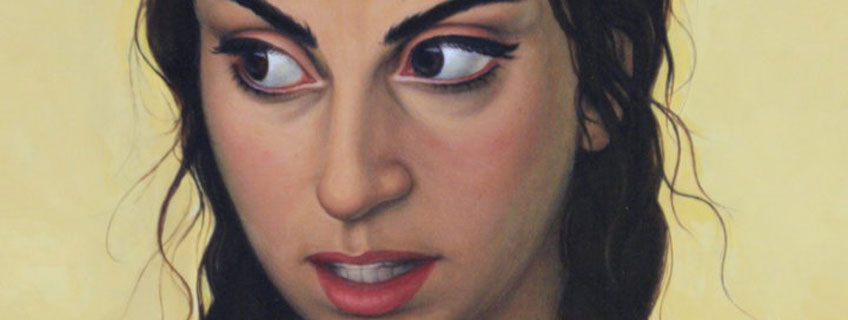- Exhibitions
- Contacts
- About
- INSTALLATION VIEWS
- COSTANTE COLORE
- ETERI CHKADUA. Gaumarjos
- GIUSEPPE STAMPONE SOLO SHOW
- JAMES CASE-LEAL. ULTRAVIOLET CATASTROPHE.
- NOTTURNO +
- PALAZZO CON VISTA. BIENNALE DI VENEZIA 2015
- PATRICK JACOBS, Nocturnes
- STEFANIA FERSINI. Show on Show
- STEFANIA FERSINI. Toreros d’Aujourd’hui
- Stefano Cerio, Aquila. Con Saluti dall’Abruzzo di Giuseppe Stampone
- VITEL TONNE’. BIENNALE DI VENEZIA 2017
- NEWS
- Artists

GEORGIAN AMAZON
by Anatolii Ulianov
The autobiographical paintings of Georgian artist Eteri Chkadua are magic feminism. But heroine, Eteri, does not resemble the classic feminist from the Seventies.
She does not wish to be a moustached essence with a green leather which revolts against the man’s world,letting grow luscious curls in armpits and accepting shape of a disgusting not well-groomed monster. Yes,this heroine is strong, at times even aggressive, butit does not believe feminity something shameful and treacherous; something, that is created to indulgemen, something that becomes a necessity to abandon for the sake of a sacred gender war.
This heroine presumes herself to be seductive and ardent. Her beauty does not prevent her from cutting off a man’s head, (“Salome”) or from knocking
down a herd of buffaloes(Drunk Cowgirl”) or to breack into a dance with dead mice in her hands (“Dancer”).This woman is attractive, but the choice of her partner and how she distinguishes her relationship with him remains her privilege, her earned right as a leader. She is charming, because she wants to be and not because somebody is expecting her to be.
In fact, Eteri happened to demonstrate the feminist of the new sample. This one is a woman who does not hesitate to be a woman. She is hateful of patriarchal slavery, but the struggle against it does not become an occasion of her transformation into a nonsexual soldier-humpback. In this respect Eteri finds the golden mean of female revolt. This is a woman’s protest, for which radical patriarchy and radical feminism appear equally not free ideologies of suppression of the female essence.
Eteri neatly mocks classical metaphors of patriarchal situations; She creates ambiguous plots. We see a woman behind bars (“Prisoner”), but she smiles. The spectator is disoriented – is the woman in the painting really in a cell, or is she glancing into the cell? Has the Man caged the woman or has he himself become her prisoner and victim? Similar ambiguity is observed in the painting “Foreign Bird,” where a magnificent pregnant woman in luxurious attire is connected by string to a man in the cap. Is he leading her or did she tie him to herself?
Thus, plots of Eteri’s paintings are a propagation for necessity of change of roles in attitudes, demonstration of a real opportunity of other hierarchies. We see apparently traditional situations which are played in another way.
Certainly, this art is not limited to fashionable feministic underlying reason. Finally, creativity of Eteri – is rather powerful, clinging, magic and bewitching painting of a high level; good synthesis of traditional and modern; the union of the verified academism and adequate sensation of today’s.
Madam Chkadua does not pursue efficiency of the colleagues from contemporary art. Five new exhibitions in a year are not necessary for her. Eteri does not hurry up, does not leave in a hasty postmodernism. Closely and scrupulously, she only patiently and passionately makes 3-4 paintings annually. Here it is impossible to see a creative sluggishness – such time is demanded for such quality.
Eteri has lived in Montreal, Tokyo, Chicago, Los Angeles, New York and, currently, in Kingston, Jamaica. Paradoxically, after all these locales, her cosmopolitan art has maintained its national color. In her art there are other cultures and aesthetic trends, textures of different styles and schools, but behind all there is a silhouette of Georgia. Art of Eteri Chkadua – is a bright example of an opportunity to speak in actual hybrid language. It is language of one country which is clear to all the world.
